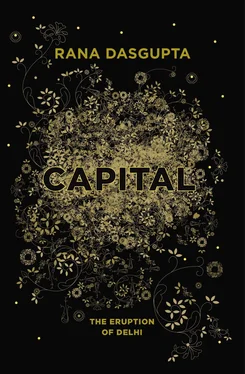There is a gloomy silence.
Gautam says philosophically, “But you have done okay. You still have two houses. You’ve provided houses for both your sons.”
Baljeet grunts lugubriously in response. He begins to describe another deal he lost out on.
“In 1976, when Sanjay Gandhi was trying to clean up Delhi, he shut down all the dairies within the city. The DDA appropriated land from villages on the outskirts and gave it to dairy farmers in compensation. But some of those areas are no longer on the outskirts at all: they’ve become very fancy since. So now the owners of those dairies are trying to get approvals to build on their land.
“The standard way to acquire a large amount of land,” he says, “is to buy it at a highly subsidised rate for some public purpose — a school, a temple, some sports facilities — and then pay an official to get the land-use changed. But it’s a gamble, because changing the land-use may not happen, and then you’re stuck with a temple.
“Three or four years ago some people were trying to sell off their dairy at a greatly inflated cost because, they said, at some point the land-use could be altered and it could be developed as real estate. They had already divided the dairy into plots, which they were selling for 12 lakhs [$24,000] each.”
Gautam says, “All of us were saying to him, ‘ Don’t do it! Don’t do it! That’s not a good investment to be in. ’ But then they did manage to change the land use!”
“Now they’re selling houses on those plots for 7 crores [$1.4 million],” says Baljeet.
He laughs wryly.
“If you made money on every deal, everybody would be doing this business. It’s high-risk. Every time you invest, you have to assume your money is gone. You have to say to yourself, ‘It’s gone.’ And then it might come back four-fold.”
He erupts into a coughing fit. He is not a healthy man.
“He always used to have a drink in his hand,” says Gautam. “He was drinking every evening and smoking two or three packets of cigarettes a day. Then last year he developed severe lung problems and had to go to hospital. He almost died. Now he’s given up.”
Baljeet grins sheepishly and makes a gesture of resignation. He shifts the conversation back to business. He offers us the benefit of his experience: how to distinguish good deals from bad. How to carry around large amounts of cash.
“I never travel the same route twice. I vary my route every time. And I don’t bring cash into the house. I keep it in a briefcase in the car. People never imagine that anyone would be so mad as to leave 30 lakhs [$60,000] in their car.”
While we are talking, Baljeet’s other son, Jimmy, drops in. He’s been out walking his dog: he lives just around the corner, in the other family house. He wears stone-washed jeans and sunglasses, and he is sweating. His mother brings him a glass of water which he downs in one go and sets back on the tray she holds patiently in front of him. There is a great weight of gold on him: gold necklaces, gold bangles, gold watch. He is in the property business too. He starts telling Gautam about a new apartment complex that’s just being built and that he thinks will do very well.
Baljeet cuffs the air in order to dismiss the opinions his son has hung there. He says to me, “He is not an expert like his father. He is way behind me.”
As if in response, Jimmy begins to vaunt his foreign travel. His father has never left India and this is an area where Jimmy can one-up him. Jimmy travels to Dubai and Bangkok as often as he can. He talks about the stuff you can buy in Dubai. The gold markets.
“Do you take your wife with you when you go?” I ask.
“I’ve taken my wife to Dubai. For shopping. Not to Bangkok. Who takes their wife to Bangkok?”
There are dirty laughs.
“Anyway I don’t let her drink,” adds Jimmy. “So there wouldn’t be any point.”
He starts talking about online poker, which is his latest obsession. He looks at the floor as he speaks. He is a braggart, but a peculiarly edgy one. He is divided within himself, and one part of him clamps down on the other.
“Jimmy refuses to go to Europe,” says Gautam, “because he’s not confident of his English. I tell him there are lots of places in Europe where they don’t speak English, but it doesn’t change anything. As far as he’s concerned, white people speak English.”
Baljeet’s wife brings out tea and pakoras. There is quiet in the room, for father and son have managed to silence each other. They are happy to listen to Gautam, who is a supremely relaxed conversationalist. He has recently bought a new car, and everyone enjoys stories of new cars.
“This guy who got it for me, he got my first car too. At that point I had a motorbike but it was giving me terrible back problems. I just happened to mention this to him and he said, ‘Get a car!’ He said if I had 75,000 rupees [$1,500], he could organise financing for the rest. I said, ‘Let me think about it.’
“The next day he called me. ‘Do you want to go ahead?’ I said, ‘Okay.’ So he said, ‘So what car do you want? What colour?’ And so on. Then he called the garage. Five minutes later he called me back and said, ‘The car will be outside your house in 45 minutes.’ We hadn’t exchanged a single piece of paperwork and a few minutes later a brand new car turned up in front of my house.
“So when I wanted to buy this car, I called him again. It cost 6 lakhs [$12,000]. I gave him a cheque for a lakh [$2,000], and he gave me the car. ‘I’ll take care of the rest,’ he said. Once again, we didn’t sign any paper. As soon as I got the car I drove it up into the mountains. While I was there this friend called me to say my cheque had bounced. I felt bad: it looked as if I had just given him a bad cheque, taken the car and run away. But he wasn’t bothered in the least. ‘Don’t worry,’ he kept saying on the phone. Like he was reassuring me. ”
Ranjit has shown up during this story. He apologises for being late. He quickly downs a cup of his mother’s tea.
“Let’s go,” he says.
We say goodbye to the parents. Jimmy follows us out of the apartment so he can check up on his dog, which is tied up downstairs. It’s a young mastiff, large and full of energy; it goes nearly hysterical when it seems us coming down the stairwell. We venture out under the gong of the sky. Jimmy lets the dog off the leash and even in this enervating heat it bounds majestically into the distance. We are in Shalimar Bagh, in the northern outskirts of Delhi, on the site of the long-forgotten gardens built by the emperor Shah Jahan; space is generous here — as it was in Bhalswa, which, though it is a separate universe, is only a twenty-minute walk away. In front of the apartment block, a great area of empty land slopes away to a surprisingly sparkling canal, which is itself a relic of the Mughal water system. The buildings are run down, but there is a sense of ease about things: the cars are parked indolently, and trees grow where they want.
As we walk, Jimmy asks me if I know anyone who might be interested in buying apartments. He gives lists of features: Italian marble floors, modular kitchens. He asks for my email address so he can send me the floor plans. We reach Gautam’s car, which is so new that the seats are still covered in plastic. We get in, and I spell out my email address through the open door. As soon as I shut it, the air conditioning starts up with a whoosh , cool on our perspiration. We drive away, the sun descending over the canal, the mastiff racing optimistically after us.
“Jimmy’s amazing,” says Gautam. “He doesn’t miss an opportunity. That guy does business with everyone. You want to borrow 5 lakhs [$10,000]? He’ll get it for you that day. You want 20,000 tampons, he’ll deliver them straight to your shop. He can forge any document you want. Anything you want to do in Shalimar Bagh he can hook you up. Who to talk to, how much to pay.”
Читать дальше











